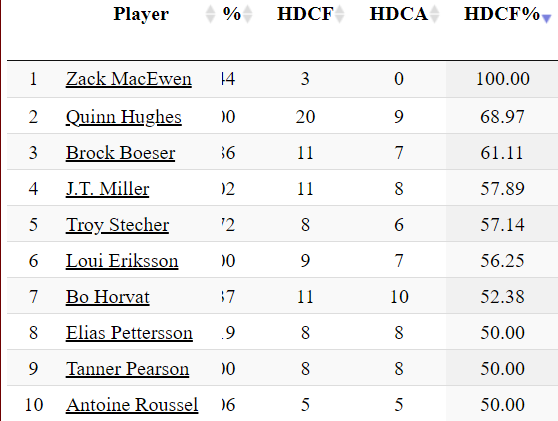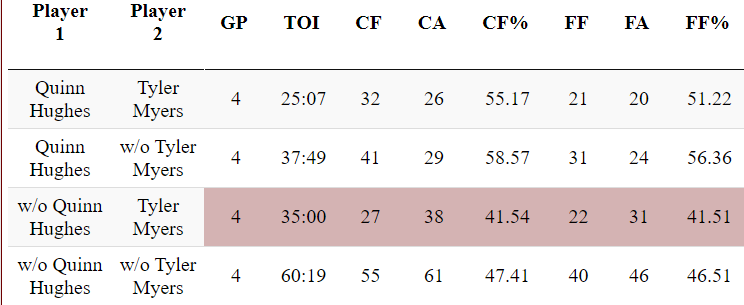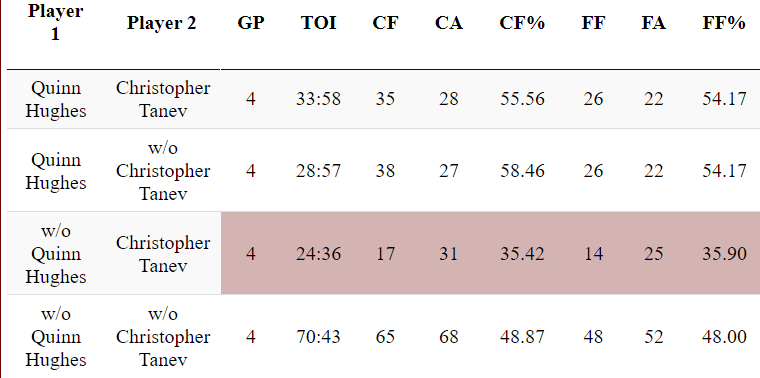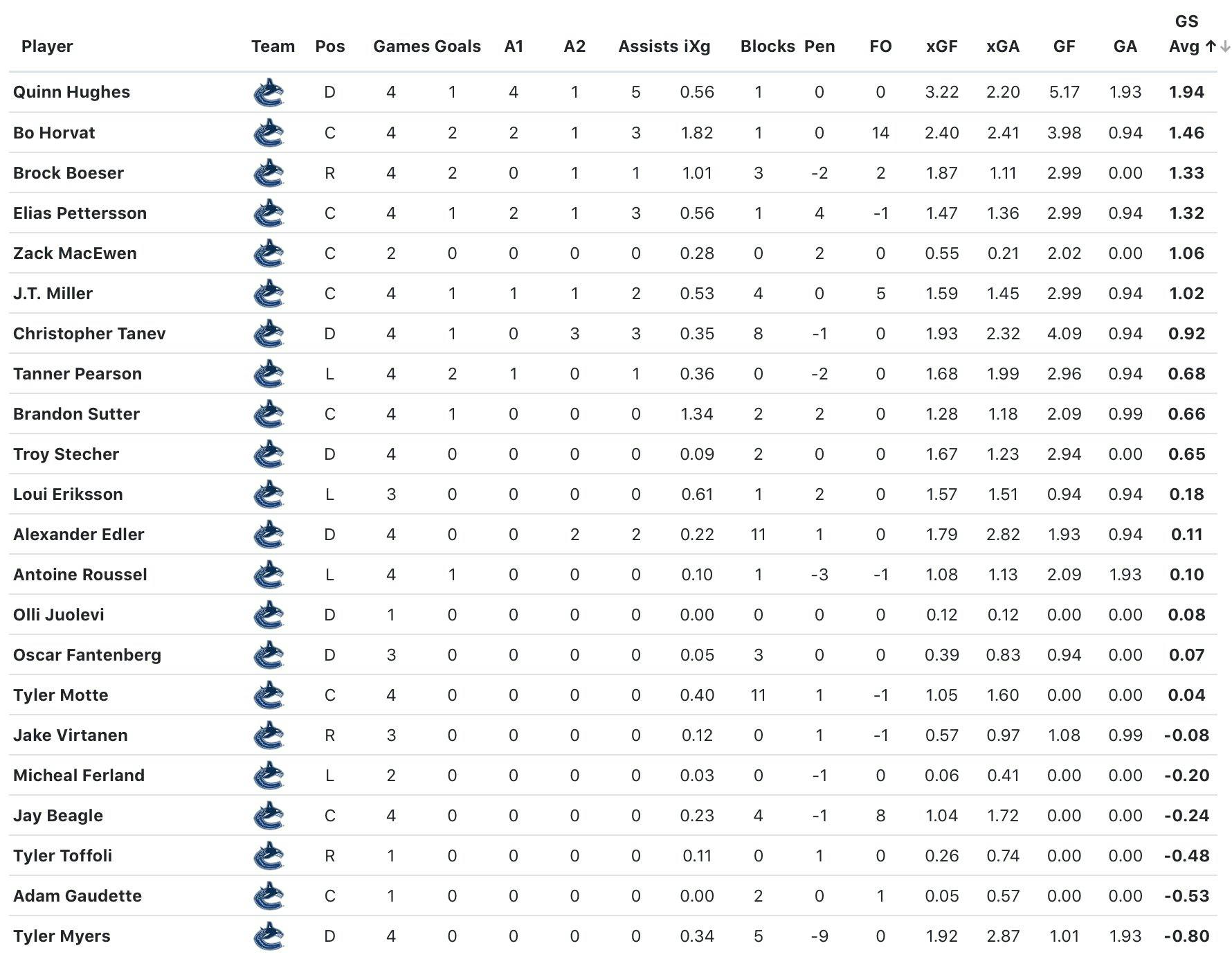Quinn Hughes just put up the most dominant postseason series ever by a Canucks defenseman

Let’s get the semantic debate out of the way right away. Some hockey fans got a little crotchety at the notion of labeling the nigh-completed 2020 Qualifying Round and its various matchups as “playoff series.” Thus, despite the fact that the stats incurred within the various play-ins will count toward players’ career playoff stats, we’ll refrain from that and instead refer to the Vancouver Canucks’ four-game victory over the Minnesota Wild as a “postseason series.”
Which leads nicely into our next debate:
Did Quinn Hughes just have the most dominant postseason series ever by a Canucks defenseman?
The answer to that one is anything but semantic — heck, it’s barely even subjective at this point.
The answer is a resounding yes.
Through four games, Hughes led the Canucks in scoring with six points, setting a franchise record for most points in a single series by a rookie defenseman. He didn’t outright break the record for a defenseman in general, as all of Jyrki Lumme, Jeff Brown, and Alex Edler have notched six points in a single series before, but each of them had the benefit of doing so in a best-of-seven format.
He’s also not the first defenceman in franchise history to lead the team in scoring for an entire series — Bob Dailey did that the first time the Canucks made the postseason in 1975 — but he is the first to do so in a winning effort.
At the time of this writing, Hughes is tied for fifth place in overall NHL postseason scoring, three points behind the swiftly eliminated Connor McDavid, and two points ahead of any other defender.
But enough about Hughes’ raw scoring totals. They’re only one small part of the wide range of stats needed to paint a complete picture of his dominance against the Wild.
As per our friends over at NaturalStatTrick, the Canucks had 59 scoring chances for and 70 against in their series versus the Wild.
Hughes was on the ice for 33 of those chances for — well over 50% — and just 22 against.
When looking at high-danger chances specifically, Hughes was on the ice for 20 by the Canucks and just nine by the Wild — giving him a preposterous HDCF percentage of 68.97%, highest on the team behind Zack MacEwen and his one scoring chance, and ninth overall among non-anomalous defenders in any of the qualifying rounds.

From NaturalStatTrick.com
The impact of Hughes can perhaps be seen most clearly when it comes to those infamous WOWY (With Or Without You) numbers, which record how individual players do when paired with certain teammates.
In this case, they’re also a very straightforward demonstration of just how much Hughes propped up his partners throughout the series. Consider the oft-penalized Tyler Myers, who managed excellent possession stats whenever he was on the ice alongside Hughes — and then saw his numbers plummet whenever he was out there with someone else.

From NaturalStatTrick.com
Believe it or not, the Hughes Effect is even starker when it comes to Chris Tanev. Far be it from us to criticize Vancouver’s beloved overtime hero, but his possession stats tanked even harder than Myers’ whenever he was away from Hughes.

From NaturalStatTrick.com
In fact, the only right-side defender to still have positive possession numbers when not paired with Hughes was Troy Stecher.
Do we really need to say more? Probably not, but we’re going to anyway — and now we’re moving on from mere advanced stats to measures of hockey-playing excellence that are downright fancy.
Dom Luszczyszyn of The Athletic keeps track of a unique stat known as Game Score, something they’ve adapted from more metrics-obsessed sports like baseball. By recording a handful of stats — including their production (separated into primary and secondary points), expected production, possession, and a host of other numbers — and then weighting them in a formula of their own invention, Luszczyszyn’s Game Score rating aims to provide an accurate measure of a single player’s performance in any one game, or their average performance over a series of games.
All of which bodes well when it comes to what the Game Score says about Quinn Hughes.

Luszczyszyn had Hughes’ Average Game Score through four games against Minnesota at 1.94, highest on the Canucks by a big country mile and nearly double what anyone on the Wild put up.
Only two other defensemen put up a greater Average Game Score in any of the play-in series, Ryan Ellis of the Nashville Predators with 2.28 and Joel Edmundson of the Carolina Hurricanes with 1.95. (Note: As of this writing, the Toronto v Columbus series has yet to conclude, meaning that someone like Seth Jones could join this group by the end of the day)
In fact, only four teams had any FORWARDS with a higher Average Game Score than Hughes.
All of which means that it’s quite possible that no other individual player, with the probable exception of Carolina’s Sebastian Aho, played as important a role in their team’s qualifying round victory than the elder Hughes.
At this point, it’s important to circle back to that first record-setting stat we mentioned for a vital contextual reminder.
Hughes set the franchise mark for points in a single series by a rookie defenseman, and please note the word we’ve highlighted for emphasis. Everything written above was accomplished by Hughes at the tail-end of his first NHL season, and as a 20-year-old.
He did it all despite having almost no postseason experience at any level of hockey prior to this.
He did it all after a multi-month hiatus, in a bubble, while a deadly pandemic wreaked havoc on his home country.
And his performance still stands as, in all likelihood, the greatest single series by a defenseman in Vancouver Canucks history.
All of which raises an important and exciting question:
What is Quinn Hughes going to do next?
Recent articles from Stephan Roget





